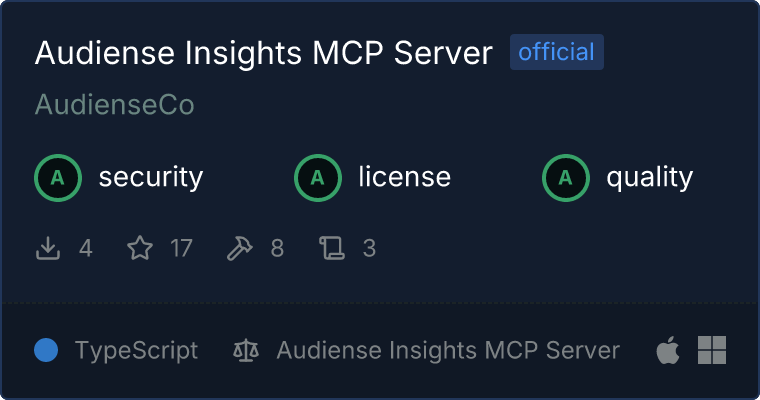🏆 Audiense Insights MCP Server

This server, based on the Model Context Protocol (MCP), allows Claude or any other MCP-compatible client to interact with your Audiense Insights account. It extracts marketing insights and audience analysis from Audiense reports, covering demographic, cultural, influencer, and content engagement analysis.

🚀 Prerequisites
Before using this server, ensure you have:
- Node.js (v18 or higher)
- Claude Desktop App
- Audiense Insights Account with API credentials
- X/Twitter API Bearer Token (optional, for enriched influencer data)
Installing via Smithery
To install Audiense Insights Server for Claude Desktop automatically via Smithery:
npx -y @smithery/cli@latest install @AudienseCo/mcp-audiense-insights --client claude
⚙️ Configuring Claude Desktop
- Open the configuration file for Claude Desktop:
* **MacOS:**
code ~/Library/Application\ Support/Claude/claude_desktop_config.json
* **Windows:**
code %AppData%\Claude\claude_desktop_config.json
Add or update the following configuration:
"mcpServers": {
"audiense-insights": {
"command": "/opt/homebrew/bin/node",
"args": [
"/ABSOLUTE/PATH/TO/YOUR/build/index.js"
],
"env": {
"AUDIENSE_CLIENT_ID": "your_client_id_here",
"AUDIENSE_CLIENT_SECRET": "your_client_secret_here",
"TWITTER_BEARER_TOKEN": "your_token_here"
}
}
}
- Save the file and restart Claude Desktop.
🛠️ Available Tools
📌 get-reports
Description : Retrieves the list of Audiense insights reports owned by the authenticated user.
- Parameters : None
- Response :
- List of reports in JSON format.
📌 get-report-info
Description : Fetches detailed information about a specific intelligence report , including:
Status
Segmentation type
Audience size
Segments
Access links
Parameters :
report_id (string) : The ID of the intelligence report.
Response :
- Full report details in JSON format.
- If the report is still processing, returns a message indicating the pending status.
📌 get-audience-insights
Description : Retrieves aggregated insights for a given audience , including:
Demographics : Gender, age, country.
Behavioral traits : Active hours, platform usage.
Psychographics : Personality traits, interests.
Socioeconomic factors : Income, education status.
Parameters :
audience_insights_id (string) : The ID of the audience insights.insights (array of strings, optional) : List of specific insight names to filter.
Response :
- Insights formatted as a structured text list.
📌 get-baselines
Description : Retrieves available baseline audiences , optionally filtered by country.
Parameters :
country (string, optional) : ISO country code to filter by.
Response :
- List of baseline audiences in JSON format.
📌 get-categories
Description : Retrieves the list of available affinity categories that can be used in influencer comparisons.
- Parameters : None
- Response :
- List of categories in JSON format.
📌 compare-audience-influencers
Description : Compares influencers of a given audience with a baseline audience. The baseline is determined as follows:
- If a single country represents more than 50% of the audience, that country is used as the baseline.
- Otherwise, the global baseline is used.
- If a specific segment is selected, the full audience is used as the baseline.
Each influencer comparison includes:
Affinity (%) – How well the influencer aligns with the audience.
Baseline Affinity (%) – The influencer’s affinity within the baseline audience.
Uniqueness Score – How distinct the influencer is compared to the baseline.
Parameters :
audience_influencers_id (string) : ID of the audience influencers.baseline_audience_influencers_id (string) : ID of the baseline audience influencers.cursor (number, optional) : Pagination cursor.count (number, optional) : Number of items per page (default: 200).bio_keyword (string, optional) : Filter influencers by bio keyword.entity_type (enum:person | brand, optional): Filter by entity type.followers_min (number, optional) : Minimum number of followers.followers_max (number, optional) : Maximum number of followers.categories (array of strings, optional) : Filter influencers by categories.countries (array of strings, optional) : Filter influencers by country ISO codes.
Response :
- List of influencers with affinity scores, baseline comparison, and uniqueness scores in JSON format.
📌 get-audience-content
Description : Retrieves audience content engagement details , including:
- Liked Content : Most popular posts, domains, emojis, hashtags, links, media, and a word cloud.
- Shared Content : Most shared content categorized similarly.
- Influential Content : Content from influential accounts.
Each category contains:
popularPost: Most engaged posts.
topDomains: Most mentioned domains.
topEmojis: Most used emojis.
topHashtags: Most used hashtags.
topLinks: Most shared links.
topMedia: Shared media.
wordcloud: Most frequently used words.
Parameters :
audience_content_id (string) : The ID of the audience content.
Response :
- Content engagement data in JSON format.
📌 report-summary
Description : Generates a comprehensive summary of an Audiense report, including:
Report metadata (title, segmentation type)
Full audience size
Detailed segment information
Top insights for each segment (bio keywords, demographics, interests)
Top influencers for each segment with comparison metrics
Parameters :
report_id (string) : The ID of the intelligence report to summarize.
Response :
- Complete report summary in JSON format with structured data for each segment
- For pending reports: Status message indicating the report is still processing
- For reports without segments: Message indicating there are no segments to analyze
💡 Predefined Prompts
This server includes a preconfigured prompts
audiense-demo: Helps analyze Audiense reports interactively.segment-matching: A prompt to match and compare audience segments across Audiense reports, identifying similarities, unique traits, and key insights based on demographics, interests, influencers, and engagement patterns.
Usage:
- Accepts a reportName argument to find the most relevant report.
- If an ID is provided, it searches by report ID instead.
Use case: Structured guidance for audience analysis.
🛠️ Troubleshooting
Tools Not Appearing in Claude
- Check Claude Desktop logs:
tail -f ~/Library/Logs/Claude/mcp*.log
- Verify environment variables are set correctly.
- Ensure the absolute path to index.js is correct.
Authentication Issues
- Double-check OAuth credentials.
- Ensure the refresh token is still valid.
- Verify that the required API scopes are enabled.
📜 Viewing Logs
To check server logs:
For MacOS/Linux:
tail -n 20 -f ~/Library/Logs/Claude/mcp*.log
For Windows:
Get-Content -Path "$env:AppData\Claude\Logs\mcp*.log" -Wait -Tail 20
🔐 Security Considerations
- Keep API credentials secure – never expose them in public repositories.
- Use environment variables to manage sensitive data.
📄 License
This project is licensed under the Apache 2.0 License. See the LICENSE file for more details.
